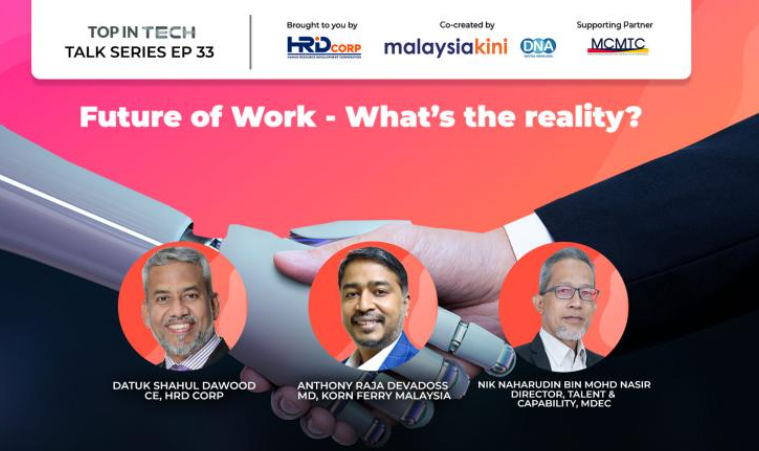
The world of work evolves over time, just like the rest of the world. Technology advancements, shifting demographics and social norms, and shifting economic and political environments are just a few of the trends and factors that are likely to have an impact on how people work in the future. While some jobs will be eliminated and many others will be created, the vast majority of positions will be transformed. Furthermore, the COVID-19 crisis accelerated existing tendencies and prompted organizations to reevaluate numerous aspects of their work, which led to an effective and modern working environment.
Episode 33 of the Top In Tech series explored deeper into the nature of the future workforce and how Malaysian companies need to prepare for these significant changes in the workplace. Moderated by Karamjit Singh, the panelists were Datuk Shahul Dawood, CE, Human Resource Development Corporation (HRD Corp), Anthony Raja Devadoss, Managing Director, Korn Ferry Malaysia and Nik Naharudin Bin Mohd Nasir, Director, Talent & Capability, MDEC.
The Impact of the Digital Workforce
Anthony noted that the main key that brought most companies towards changing the world of work was during the COVID-19 pandemic. "The COVID-19 pandemic has accelerated changes in the world of work that were already underway and have led to many predictions about what the future of work will look like. Some of the ways in which COVID-19 has likely impacted the future of work are with the introduction of remote work and hybrid work", said Anthony.
"Most companies agreed that the new concept of work indeed gives numerous advantages that deliver benefits to the company. Countless global companies now have shown major interest in offering an international worker to do remote work as they now have direct access to a broader talent pool whereby companies can now hire talented individuals from anywhere in the world, rather than being restricted to hiring locally. Remote workers can often be more productive than those who work in traditional office settings, as they can create a work environment that suits their individual needs and preferences," said Nik.
Aging Workforce - Gem for Companies and the Digital Market
According to Datuk Shahul, even though the future focuses on new faces, the aging workforce is an asset to an organization. He thought that an older workforce could be good for the future of work in many ways, such as through experience, expertise, a strong work ethic, diversity and inclusion, less turnover, and new job opportunities. Employers who take advantage of these benefits and find ways to keep older workers interested and help them will be in a good position to do well in a changing world of work.
"I believe that the senior citizen can be a great aid to organizations, as older employees often bring a wealth of experience and knowledge that younger employees may not have had the opportunity to acquire. They have been through various economic cycles, technological shifts, and management styles, which can provide them with unique insights into how to navigate challenges that a company may face". Overall, companies should value and utilize the experience and knowledge of their older employees, as it can be a valuable asset in achieving success", said Datuk Shahul.
Nik stated that the aging workforce is still reliable in the market today. With technology, people aged 50 and above can still work. "With the skills that they’ve obtained for decades, they can easily adapt themselves to a new work environment. For instance, they are able to deliver their professional skills in the digital market, for professions such as consultant, graphic designer, and more".
How Does Technology Affect the Work Environment Today?
"Technology indeed affects the work environment today. We can see numerous companies in Malaysia have started to transition from the traditional working system into a technology-focused workforce. With this new workforce introduction, it helps the employees to constantly learn and improve their power skills, a combination of human and digital skills", said Anthony.
"Technologies have been playing a vital role in HRD Corp. At HRD Corp, we believe that by maximizing the available resources of technology, we can help our workforce and system work effectively and efficiently at a fast pace. HRD Corp has also been utilizing an artificial intelligence (AI) system in providing grants, whereby almost 22,000 grant applicants have been processed in less than a month with the help of AI technology. Hence, technology is effective in making companies more profitable and efficient”, said Datuk Shahul.
Key Takeaways
"Embracing hybrid work is good. This flexibility allows the team to strengthen their working skills, such as decision-making and teamwork. The respective leaders can align and work together, resulting in better work engagement, support, and productivity in the workplace", concluded Anthony.
“The future of work is usually associated with demanding employees and a demanding workforce. However, if we look thoroughly, the future of work is more about providing a conducive environment for the employees and giving them a work-life balance, which can be achieved by maximizing the use of technology in the workplace. Successful companies will need to be agile and adaptable, and workers will need to be flexible and willing to continually learn and upskill," concluded Datuk Shahul.
"We have to embrace digital. Digital service tools and social media are now important in communicating and networking with colleagues and clients. Practising the technology and modern work system, helps the company build a more healthy work environment and increases workers' effectiveness when doing work", concluded Nik.
Find out more about the discussion from the replay of Top In Tech Ep33: Future of Work - What’s the reality HERE.



